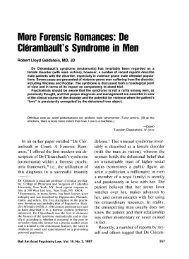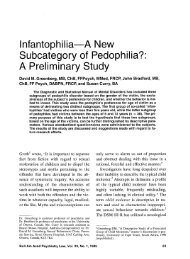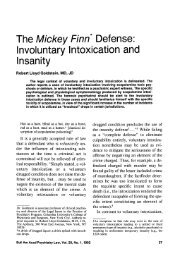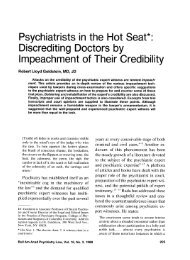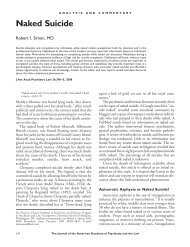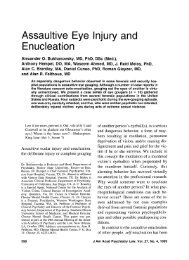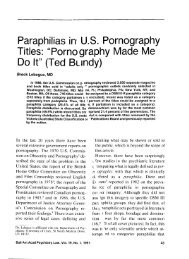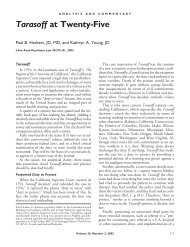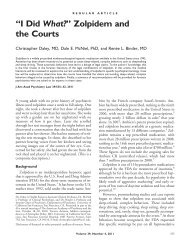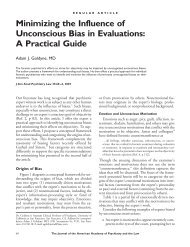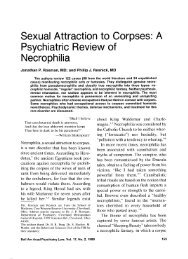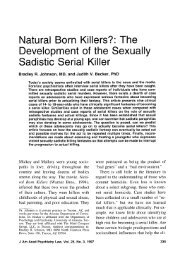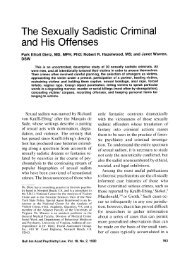Accommodations for Test Anxiety Under ADA?
Accommodations for Test Anxiety Under ADA?
Accommodations for Test Anxiety Under ADA?
Create successful ePaper yourself
Turn your PDF publications into a flip-book with our unique Google optimized e-Paper software.
<strong>Accommodations</strong> <strong>for</strong> <strong>Test</strong> <strong>Anxiety</strong> <strong>Under</strong> <strong>ADA</strong>?<br />
taken by an accommodated test-anxious<br />
examinee and grade the essays accordingly.<br />
Criteria <strong>for</strong> Granting <strong>Accommodations</strong><br />
In granting accommodations <strong>for</strong><br />
test anxiety, examiners should be vigilant<br />
about potential abuses. Judgments about<br />
clinical significance are often subjective,<br />
and clinicians can differ widely. Accordingly,<br />
examiners should insist that clinicians<br />
who diagnose the disorder provide<br />
evidence of clinical significance, including<br />
perhaps scores on psychological tests.<br />
Of course, people can be dishonest both<br />
to their diagnosing clinician and on the<br />
psychological tests, and this dishonesty<br />
will be difficult to uncover.<br />
The most important criterion of clinical<br />
significance <strong>for</strong> the purpose of accommodation<br />
is the degree to which test anxiety<br />
impairs per<strong>for</strong>mance. A student whose<br />
knowledge and skills warrant a grade of<br />
A- but who gets only a B+ on exams<br />
because of anxiety is not clinically impaired<br />
and may not deserve accommodations<br />
despite the subjective distress. On<br />
the other hand, if that same student manages<br />
only Cs and Ds on exams, then the<br />
impairment is significant, the test scores<br />
clearly do not reflect the student's knowledge.<br />
and accommodations are in order.<br />
There<strong>for</strong>e, examiners should insist on evidence<br />
of discrepancies between test<br />
grades and other measures of what the<br />
student has learned. The latter can be<br />
obtained from grades on homework, papers,<br />
projects, classroom discussions. and<br />
the professor's or a teaching assistant's<br />
impressions based on evidence such as<br />
conversations with the student or a review<br />
of the exam after a poor per<strong>for</strong>mance.<br />
Conclusion<br />
<strong>Test</strong> anxiety can prevent examinees<br />
from demonstrating their knowledge and<br />
skills, and <strong>for</strong> them the test ceases to be a<br />
valid assessment instrument. For this reason<br />
alone. testers should want to accommodate<br />
test-anxious examinees and restore<br />
the test to its intended function.<br />
Such accommodations also help examiners<br />
avoid unnecessary litigation since, as I<br />
have tried to show, a good case can be<br />
made that test anxiety is covered by<br />
<strong>ADA</strong>, especially when it is a component<br />
of Social Phobia, Generalized.<br />
At the same time. examiners will want<br />
to protect the integrity and fairness of the<br />
test. Criteria <strong>for</strong> adequate documentation<br />
supporting a diagnosis of test anxiety<br />
should be made explicit. I have suggested<br />
that an important criterion should be evidence<br />
that the test anxiety significantly<br />
impairs per<strong>for</strong>mance as compared with<br />
assessments from non-test situations.<br />
When a diagnosis has been established,<br />
examiners should grant the minimum accommodation<br />
necessary to enable the examinees<br />
to operate within the normal<br />
range of anxiety. Often a separate, quiet<br />
room is all that is needed. If, however. an<br />
untimed examination is necessary. then<br />
examiners should keep a record of the<br />
time actually used and take that into consideration<br />
in grading the exam. With sufficient<br />
<strong>for</strong>esight and planning, solutions<br />
can be devised that will optimize validity<br />
<strong>for</strong> the test and fairness <strong>for</strong> all examinees.<br />
References<br />
I. Zuriff GE: Learning disabilities in the academy:<br />
a professor's guide. Acad Quest 10:53-<br />
65, Winter 1996-97<br />
J Am Acad Psychiatry Law, Vol. 25, No. 2, 1997 205




